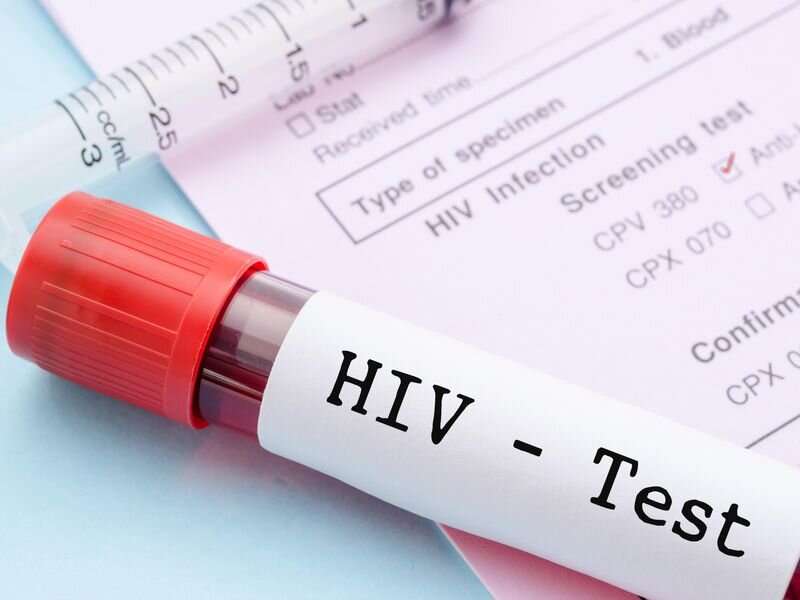This article has been reviewed according to Science X's editorial process and policies. Editors have highlighted the following attributes while ensuring the content's credibility:
fact-checked
peer-reviewed publication
reputable news agency
proofread
PrEP implant that protects against HIV could be near

Animal research is pointing toward a new way to prevent HIV infection: a refillable implant that continuously delivers antiretroviral medications for up to 20 months at a time.
Antiretrovirals are the cornerstone of PrEP, an infection prevention protocol that has been around since 2010.
But the new approach—though so far only tested in rhesus macaque monkeys—promises an even more hassle-free way to deliver the drugs. The goal is to make PrEP easier to use for patients who have trouble adhering to a pill or injection timetable.
"When taken as prescribed, PrEP can reduce the risks of HIV infection," said study author Alessandro Grattoni, chair of the Department of Nanomedicine at Houston Methodist Research Institute.
But the problem with existing methods, Grattoni explained, is that many patients miss or simply forget to take their medications as scheduled.
"Forgetting to take oral pills or injections reduces the efficacy of PrEP, and thus increases the chances of contracting HIV," he noted.
Additionally, there is no way to undo a PrEP injection if a patient experiences a bad reaction, Grattoni added.
The implant, he explained, addresses such concerns, and so far testing in monkeys suggests the approach is safe and fully protective. However, animal research does not always bear out in humans.
There are now only two methods for administering PrEP: pill or injection.
First approved in 2012, oral PrEP is single tablet composed of a combination of two antiretroviral medications. One is sold under the brand name Truvada, and contains FTC and TDF (emtricitabine and tenofovir disoproxil fumarate). As of 2016, a second option called Descovy was introduced. It contains FTC and TAF (tenofovir alafenamide).
When taken daily, oral PrEP reduces the risk of getting HIV from sex and/or injection drug use by 99% and 74%, respectively. Once-daily use is the only oral method currently approved by the U.S. Food and Drug Administration, though an off-label "on demand" protocol has been developed for patients who prefer to take PrEP tablets only just before and just after engaging in risky sexual behavior.
The injectable method, called Apretude, was first approved by the FDA in 2021. Intended for patients who either have a bad reaction to oral PrEP or have trouble sticking to a once-a-day pill regimen, the injection contains the antiretroviral cabotegravir. Injectable PrEP is first administered via two shots, taken a month apart, and then once every two months from that point forward. Studies suggest the shot is slightly more effective at preventing HIV infection than the pills.
Grattoni's team set out to test delivering PrEP via medical-grade titanium implants placed just below the skin.
The implants are designed to be safe against both leaks and ruptures, and have space for roughly .57 milliliters of an experimental antiviral medication called islatravir (ISL).
Testing initially involved just four male rhesus macaques over a period of 20 months.
As intended, the ISL drug successfully "diffused" through the implant and into each animal's bloodstream. And the team concluded that throughout the study circulating blood concentrations of ISL matched the desired protective levels that would have been seen had the monkeys received ISL via a weekly pill.
Investigators then conducted both rectal and vaginal simian HIV exposure tests, involving six monkeys outfitted with implants and 12 monkeys who were not.
The team first determined that within just one day all the monkeys who received implants had amassed protective levels of circulating ISL. Further testing revealed that all the implanted monkeys appeared to be fully protected against simian HIV exposure via both the rectum and the vagina, with no safety or tolerance issues.
Given that prior research had suggested the implant would work, "we were more excited than surprised with our results," Grattoni noted.
"Next steps are to determine what is the lowest dose needed for continued protection, and whether the implant is effective against different routes of HIV infection, [both] sexual and injection drug users," he said.
Grattoni said his team is now prepping for a human trial, "and we hope for clinical testing within three years. If all goes well with human trials, we think the implant could be available within five years."
The findings were published June 28 in the journal Science Translational Medicine.
Dr. Michael Horberg is director of HIV/AIDS and STD with the Kaiser Permanente and Care Management Institute in Rockville, Md.
Though not part of the implant research team, Horberg said the finding "is promising."
"We've seen this type of approach with contraception...," he noted. "I think it has great potential here. But always, prevention only works if taken, and just because it was successful in animals, doesn't mean it will be in humans.
"And like all implants," Horberg cautioned, "they have to be replenished at some point. And that requires patients and providers remembering to do that on time."
More information: Fernanda P. Pons-Faudoa et al, Long-acting refillable nanofluidic implant confers protection against SHIV infection in nonhuman primates, Science Translational Medicine (2023). DOI: 10.1126/scitranslmed.adg2887
There's more on PrEP at the U.S. Centers for Disease Control and Prevention.
Copyright © 2023 HealthDay. All rights reserved.




















